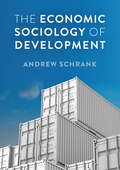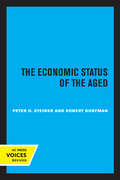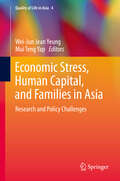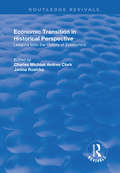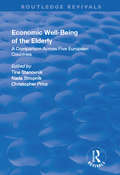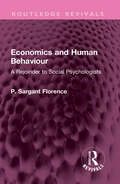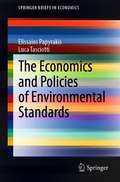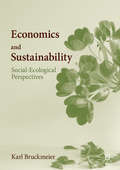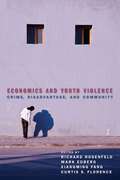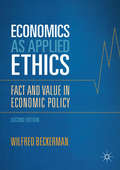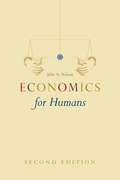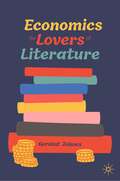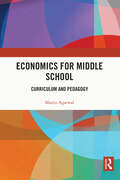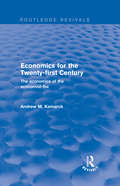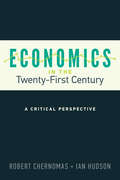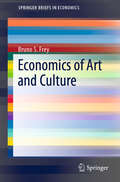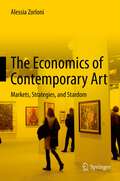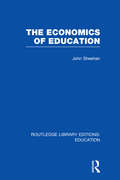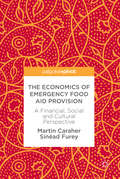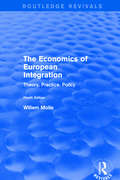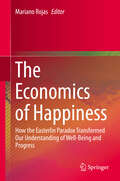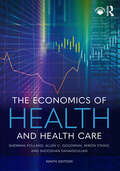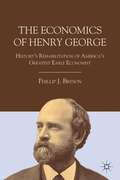- Table View
- List View
The Economic Sociology of Development (Economy and Society)
by Andrew SchrankBringing the study of international inequality back into the core of sociological theory, this book offers a user-friendly introduction to development and underdevelopment. In doing so, it places various approaches to the definition, measurement, and understanding of “development” against the backdrop of broader sociological debates. Schrank draws concrete examples from different regions and epochs to explore sociological thinking about development and underdevelopment informed by the latest currents in economic sociology. Across a series of chapters, he identifies relationships between mainstream and Marxist approaches to the study of international inequality; uses classical and contemporary social theory to develop a parsimonious typology of national development outcomes; addresses cross-border learning and diffusion in light of the latest developments in organization theory; considers the roles of religious, racial, and gender identities in the development process in different places and times; and portrays contemporary global challenges ‒ such as populism, pandemics, and climate change ‒ as distinctly sociological problems in need of multifaceted solutions. Enriched with expository figures, tables, and diagrams, this accessible book simultaneously distills and develops the sociological approach to the study of development and underdevelopment for both undergraduate and graduate students across the social sciences.
The Economic Status of the Aged
by Peter O. SteinerThis title is part of UC Press's Voices Revived program, which commemorates University of California Press’s mission to seek out and cultivate the brightest minds and give them voice, reach, and impact. Drawing on a backlist dating to 1893, Voices Revived makes high-quality, peer-reviewed scholarship accessible once again using print-on-demand technology. This title was originally published in 1957.
Economic Stress, Human Capital, and Families in Asia
by Wei-Jun Jean Yeung Mui Teng YapThis book presents recent findings about the consequences and policy implications of economic stress for human capital development and family well-being in Asia. The scope of the chapters goes beyond the impact of current financial crisis to include the effect of economic deprivation families in Asia experience as a result of job loss, low-wage employment, and catastrophic natural calamities. The studies show how macro-level economic stress can filter down through households to affect individuals' economic and socio-psychological well-being. The chapters reveal a wide spectrum of economic stresses experienced by families in Asia that is linked to poor human capital development, emotional distress, health problems, changing fertility patterns, more frequent geographic movement, and less supportive parenting behavior. The elderly, women, children, low-skilled workers are particularly vulnerable. The economic shocks in the past several decades have exposed the vulnerability of the family institution and the weaknesses in this region's social protection system that can lead to detrimental long-term effects on human capital development. This book is relevant for researchers and students in fields such as Family Studies, Globalization, Development, Social Problems, Social Stratification, Social Inequalities, Poverty and Welfare, Education, and Social Policies.
Economic Transition in Historical Perspective: Lessons From The History Of Economics (Routledge Revivals)
by Charles Michael Andres Clark Janina RosickaThis title was first published in 2001. This volume of essays studies the problem of transition in economics from a historical perspective. It uses historical ideas and theories in a modern context to examine economic thought. It aims to show that social and historical context are important when considering economic transitions.
Economic Well-Being of the Elderly: A Comparison Across Five European Countries (Public Policy And Social Welfare Ser.)
by Nada StropnikProviding an in-depth analysis of the economic well-being of the elderly across five European countries - UK, Austria, Hungary, Poland and Slovenia - this book offers an assessment of the performance of national social security systems in terms of income provision for the elderly. Each country analysis strictly adheres to a common methodological framework. This enables meaningful cross-country comparisons, revealing important common developments in the economic well-being of the elderly in all five countries. The authors also examine country specific features and every country chapter is written by an expert in the field who has a thorough knowledge of both the national pension systems and the data sets on which the empirical analyses are based.
Economics and consumer behavior
by Angus Deaton John MuellbauerThe idea of duality has proved to be a powerful device in modern work on the economics of consumer behaviour. The authors have used duality to provide an integrated and accessible treatment of this subject. The book focuses on applications of the theory to welfare economics and econometric analysis. The book begins with four chapters that provide a self-contained presentation of the basic theory and its use in applied econometrics. These chapters also include elementary extensions of the theory to labour supply, durable goods, the consumption function, and rationing. The rest of the book is divided into three parts. In the first of these the authors discuss restrictions on choice and aggregation problems. The next part consists of chapters on consumer index numbers; household characteristics, demand, and household welfare comparisons; and social welfare and inequality. The last part extends the coverage of consumer behaviour to include the quality of goods and household production theory, labour supply and human capital theory, the consumption function and intertemporal choice, the demand for durable goods, and choice under uncertainty.
Economics and Human Behaviour: A Rejoinder to Social Psychologists (Routledge Revivals)
by Philip Sargant FlorenceFirst published in 1927, Economics and Human Behaviour is a defence of orthodox economics against the attacks of social psychology. The author has explicated on the characteristics and value of both orthodox economics as well as psychology, and then presented psychology’s criticism against orthodox economics. Before concluding with the limitations of both disciplines, this tiny book reinstates the importance of orthodox economics in the gathering and interpretation of facts. Given the predominance of economics over psychology in current times, this book will be an interesting read for anyone keen on imagining the tables turned. It will also appeal to students of economics, history and psychology.
The Economics and Policies of Environmental Standards (SpringerBriefs in Economics)
by Elissaios Papyrakis Luca TasciottiThis book provides a critical perspective on several interconnected themes that relate to the implementation of both domestic and international environmental standards. What are the direct and indirect costs and benefits of these standards? What is the political economy structure that governs their implementation? Do environmental standards affect individuals and economic sectors in different ways? How do environmental standards interact with trade patterns in an ever-globalised world? Understanding the multidimensional effects of environmental standards is crucial for the establishment of effective environmental and development policies. The book presents our current state of knowledge for the issues presented, while also drawing policy insights from a WTO project (on phytosanitary standards) the authors undertook in four Sub-Sahara African countries (Botswana, Cameroon, Kenya and Mozambique).
Economics and Sustainability: Social-Ecological Perspectives
by Karl BruckmeierThis textbook provides an overview of economic perspectives on sustainability. It synthesises economic, ecological and interdisciplinary sustainability research and by applying an integrated social-ecological and economic framework, demonstrates how this research can be improved and implemented in practice. Split into three parts, the book begins by introducing a range of topics forming the basis of knowledge needed to understand the varying sustainability discourses in economics, ecology and interdisciplinary sustainability research. Chapters cover the political context of sustainability; the history of sustainability in European environmental discourses dating back to the seventeenth century; as well as various problems and forms of interdisciplinary knowledge integration and synthesis in the sustainability process. Part II reviews the core economic themes relevant to sustainable development including natural resource management, environmental economics and ecological economics. Also highlighted are often neglected issues such as conflicts, disasters and interrelated crises on the way towards sustainability. The chapters in Part III discuss the future of the sustainability process. They argue for the necessity of overhauling the relationship between science and practice; explore failures and the unforeseen difficulties of sustainability transformation; and discuss how to enable a long term sustainability process that reaches into the distant future.An innovative resource for a broad range of interdisciplinary programmes on sustainability. The book will be an invaluable reference for master and PhD students, instructors, researchers and practitioners in sustainability governance.
Economics and Youth Violence: Crime, Disadvantage, and Community
by Richard Rosenfeld Curtis S. Florence Mark Edberg Xiangming FangHow do economic conditions such as poverty, unemployment, inflation, and economic growth impact youth violence? Economics and Youth Violence provides a much-needed new perspective on this crucial issue. Pinpointing the economic factors that are most important, the editors and contributors in this volume explore how different kinds of economic issues impact children, adolescents, and their families, schools, and communities. Offering new and important insights regarding the relationship between macroeconomic conditions and youth violence across a variety of times and places, chapters cover such issues as the effect of inflation on youth violence; new quantitative analysis of the connection between race, economic opportunity, and violence; and the cyclical nature of criminal backgrounds and economic disadvantage among families. Highlighting the complexities in the relationship between economic conditions, juvenile offenses, and the community and situational contexts in which their connections are forged, Economics and Youth Violence prompts important questions that will guide future research on the causes and prevention of youth violence. Contributors: Sarah Beth Barnett, Eric P. Baumer, Philippe Bourgois, Shawn Bushway, Philip J. Cook, Robert D. Crutchfield, Linda L. Dahlberg, Mark Edberg, Jeffrey Fagan, Xiangming Fang, Curtis S. Florence, Ekaterina Gorislavsky, Nancy G. Guerra, Karen Heimer, Janet L. Lauritsen, Jennifer L. Matjasko, James A. Mercy, Matthew Phillips, Richard Rosenfeld, Tim Wadsworth, Valerie West, Kevin T. Wolff
Economics as Applied Ethics
by Wilfred BeckermanThe focus of this textbook is on the link between ethics and economic policy analysis. Basic philosophical concepts are systematically described, followed by conventional welfare economic theory and policy, and applications to some topical economic problems such as income distribution and sustainable development.
Economics for Humans, Second Edition
by Julie A. NelsonAt its core, an economy is about providing goods and services for human well-being. But many economists and critics preach that an economy is something far different: a cold and heartless system that operates outside of human control. In this impassioned and perceptive work, Julie A. Nelson asks a compelling question: given that our economic world is something that we as humans create, aren’t ethics and human relationships—dimensions of a full and rich life—intrinsically part of the picture? Economics for Humans argues against the well-ingrained notion that economics is immune to moral values and distant from human relationships. Here, Nelson locates the impediment to a more considerate economic world in an assumption that is shared by both neoliberals and the political left. Despite their seemingly insurmountable differences, both make use of the metaphor, first proposed by Adam Smith, that the economy is a machine. This pervasive idea, Nelson argues, has blinded us to the qualities that make us work and care for one another—qualities that also make businesses thrive and markets grow. We can wed our interest in money with our justifiable concerns about ethics and social well-being. And we can do so if we recognize that an economy is not a machine, but a living thing in need of attention and careful tending. This second edition has been updated and refined throughout, with expanded discussions of many topics and a new chapter that investigates the apparent conflict between economic well-being and ecological sustainability. Further developing the main points of the first edition, Economics for Humans will continue to both invigorate and inspire readers to reshape the way they view the economy, its possibilities, and their place within it.
Economics for Lovers of Literature
by Geraint JohnesThis book provides an engaging introduction to economics through a literary lens. Drawing on writers such as James Joyce, George Eliot, Edith Wharton, Jane Austen, Charlotte Bronte, and Elizabeth Gaskell, each chapter is framed around a quote from a classic text of English literature that helps tease out a key economic concept and demonstrate its broader relevance. While rigorous, the book is virtually free of technical language and aims to give a concise overview of all the main topics in contemporary economics – from supply and demand, pricing, labour markets, externalities, and game theory, to environmental and behavioural economics, fiscal policy and business cycles, modern approaches to macroeconomics and economic growth.Interweaving literary examples with easy-to-follow explanations and reflective tasks, the book takes an interdisciplinary approach to economics and literature that requires no prior knowledge in either camp, but which illuminates patterns of real-world behaviour observed by novelists and economists alike. This concise and accessible book will be a valuable tool for students embarking on introductory economics courses, economics modules in business studies, and interdisciplinary courses more broadly, as well as the general reader interested in building their knowledge of economics.
Economics for Middle School: Curriculum and Pedagogy
by Manju AgarwalThis book discusses the importance of teaching fundamental economic concepts as part of the middle school social science curriculum in India. It examines the status of economics in Indian schools, the issues faced in teaching it at the middle school level, and emphasizes the need for increasing the economic literacy of students. It offers valuable recommendations to curriculum planners and educators to help them bolster economics education in Indian schools. The author presents an extensive curriculum framework with the intention of developing intellectual and social skills in students. The book also features classroom tested lessons, content guidelines, and a comprehensive teaching plan for grades six, seven, and eight. A crucial contribution to the study of school education in India, this book will be of interest to teachers, students, and researchers of education, economics education, and economics. It will also be useful for policy planners, professional economists, administrators, school boards, and research institutions.
Economics for the Twenty-first Century: The Economics of the Economist-fox
by Andrew M. KamarckThis title was first published in 2001. To be effective, economics must take into consideration the complex nature of human beings and the contextual, institutional, social and historical factors at play. This text is designed to help economists to be economic foxes by increasing the range of economists' tools, drawing on the knowledge and experience of other disciplines, to cope better with the extraordinary complexity of the modern economy. The objective is to provide the same kind of revelation in understanding an economy that an artist possesses in the visual arts. A beginner looking at a still life sees a green bottle, a red apple and a yellow cloth on a table top. An artist, however, can point out to him all the nuances of colour. Following a rapid dissection of the canonical hypotheses of contemporary economic theory, different sectors of the real economy are explored: the corporation; corporate governance; services; the public sector; civil society; professions; social capital; national cultures; and the tropics.
Economics in the Twenty-First Century: A Critical Perspective
by Ian Hudson Robert ChernomasEconomics has always been nicknamed the "dismal science," but today the field seems a little more dismal than usual as governments, social movements, and even students complain that the discipline is failing to make sense of the major economic problems of the day.In Economics in the Twenty-First Century, Robert Chernomas and Ian Hudson demonstrate how today's top young economists continue to lead the field in the wrong direction. The recent winners of the John Bates Clark medal, economics's "baby Nobel," have won that award for studying important issues such as economic development, income inequality, crime, and health. Examining their research, Chernomas and Hudson show that this work focuses on individual choice, ignores the systematic role of power in the economic system, and leads to solutions that are of limited effectiveness at best and harmful at worst.An accessible summary of the latest debates in economics, Economics in the Twenty-First Century takes on what is missing from mainstream economics, why it matters, and how the discipline can better address the key concerns of our era.
Economics of Art and Culture (SpringerBriefs in Economics)
by Bruno S. FreyThis book studies the relationship between the arts and the economy. By applying economic thinking to arts and culture, it analyses markets for art and cultural goods, highlights specific facets of art auctions and discusses determinants of the economic success of artists. The author also sheds new light on various cultural areas, such as the performing and visual arts, festivals, films, museums and cultural heritage. Lastly, the book discusses cultural policies, the role of the state in financing culture, and the relationship between the arts and happiness.
The Economics of Contemporary Art
by Alessia ZorloniThe book examines the contemporary art system with a broad and systematic approach, through the application of models of microeconomics and industrial organizations. By breaking down the traditional barriers between different academic disciplines such as art and economics, this book offers a unique opportunity to grasp the complexities of the contemporary art world and provides the tools to conduct a structural analysis of that market. The result is an in-depth analysis of the contemporary art market from an interdisciplinary perspective. While it is not a textbook in the strictest sense, the book offers a concise and effective overview of all actors in the art system, and provides supporting data and valuable information, both conceptual and practical. It is therefore a text that can be used by students wishing to better understand the complex dynamics that govern the contemporary art market, but also by cultural managers, collectors, potential art investors or simply art lovers who need a quick reference.
The Economics of Economists
by Alessandro Lanteri Jack VromenThis is the first of a two volume collection of the late Julian Simon s important and radical contributions to a wide variety of economic problems. Often considered as controversial and unorthodox, these essays challenge conventional approaches. The book begins with introductory chapters in which the author discusses his background and experiences as a controversial scholar. Divided into six parts, the first part considers some basic concepts on issues such as welfare, natural resources, causality and product differentiation. The second part contains essays on managerial economics as well as general microeconomics including monopoly, duopoly and oligopoly. Advertising is discussed in the third part and industrial organization in the fourth. Part five focuses on policies for exchange and auction considering, among other issues, airline overbooking, and the final section features articles on macroeconomics. This collection of controversial essays will be welcomed by academics and students interested in unorthodox approaches to various economic theories and concepts.
The Economics of Education (Routledge Library Editions: Education)
by John SheehanThis book is a survey of the principal aspects of the economics of education, such as the demand for education as consumption and as an investment, good education and economic growth, education and manpower needs, and the finance of education. In some cases in recent years, economic theory has been applied to educational problems in order to gain an insight into the workings of the educational system. The result has been a certain amount of confusion and distrust among teachers and educationists: confusion because some theoretical aspects are not easily understood and distrust of the economist’s intrusion into educational policy-making. This book overcomes these problems by making minimal demands on prior knowledge of economics and by emphasizing the limitations of economic analysis applied to policy matters.
The Economics of Emergency Food Aid Provision: A Financial, Social And Cultural Perspective
by Sinéad Furey Martin CaraherThis short book reviews the provision of food bank and other emergency food aid provision with a specific focus on the UK, whilst drawing lessons from North America, Brazil and Europe. The authors look at the historical positioning of food aid and the growth of the food aid sector in the UK following the period of austerity 2007-2012, before addressing the causes of food insecurity and concluding that food banks are a symptom of austerity and government inaction which fail to tackle the underlying causes of food poverty. The research is timely, and considers a range of disciplines and practices. This book will appeal to researchers, policy makers and practitioners food economics, welfare economics, public policy, public health, food studies, nutrition, and the wider social sciences.
The Economics of European Integration: Theory, Practice, Policy (Routledge Revivals Ser.)
by Willem MolleThis title was first published in 2001. As economic integration touches ever more areas of society, more and more people are confronted by the bewildering complexity of the functioning of the European Union. Rather than merely focusing on the description of EU policies, this study of the economics of European integration seeks to: select the most relevant aspects and developments; place the wide variety of issues in a robust conceptual structure; integrate theoretical developments with the results of empirical research and of policy analysis; explain the logic of the dynamic processes; describe the structural features of the European economy; highlight the response of private companies to changes in the regulatory environment; depict the historical developments so as to give a sound basis for the understanding of the present situation and the likely future development; and set the European developments in the light of global developments. In practice Western Europe is the focus of major parts of this book.
The Economics of Happiness: How the Easterlin Paradox Transformed Our Understanding of Well-Being and Progress
by Mariano RojasThis book presents a panoramic view of the implications from Richard Easterlin’s groundbreaking work on happiness and economics. Contributions in the book show the relevance of the Easterlin Paradox to main areas, such as the relationship between income and happiness, the relationship between economic growth and well-being, conceptions of progress and development, design and evaluation of policies for well-being, and the use of happiness research to address welfare economics issues. This book is unique in the sense that it gathers contributions from senior and top researchers in the economics of happiness, whom have played a central role in the consolidation of happiness economics, as well as promising young scholars, showing the current dynamism and consolidation of happiness economics.
The Economics of Health and Health Care: International Student Edition, 8th Edition
by Sherman Folland Allen C. Goodman Miron Stano Shooshan DanagoulianThe Economics of Health and Health Care is the market-leading health economics textbook, providing comprehensive coverage of all the key topics, and balancing economic theory, empirical evidence, and public policy. The ninth edition offers updated material throughout, including two new chapters: Disparities in Health and Health Care (Chapter 7) examines issues of race, ethnicity, income, gender, and geography with respect to health care access, health inputs, and health outcomes; Pandemic Economics (Chapter 9) introduces a new and simplified economic treatment of epidemics and pandemics within the context of COVID-19. We also include applications from the growing literature on digital medicine. The book further highlights the impacts of the Affordable Care Act (ACA) and updates its path-breaking comparative analyses across countries to focus on the differences in access and costs. The book continues to provide a clear, step-by-step understanding of health economics, making economic principles accessible to students, supported by boxed examples, figures and tables. Each chapter contains concise summaries, discussion questions, and quantitative exercises to promote student learning. There is also a glossary of key terms and an extensive reference list. Instructors are supported by a range of digital supplements. It is the perfect textbook for students and practitioners taking undergraduate and postgraduate courses in health economics, health policy, and public health.
The Economics of Henry George
by Phillip J. BrysonHenry George the greatest, most famous and most rejected of early American economists who trained himself in classical economics and developed a theory of a 'single tax'. There is much literature on many specific facets and aspects of George's work, but we lack a book which provides an overview of George's economics. . . until now!
